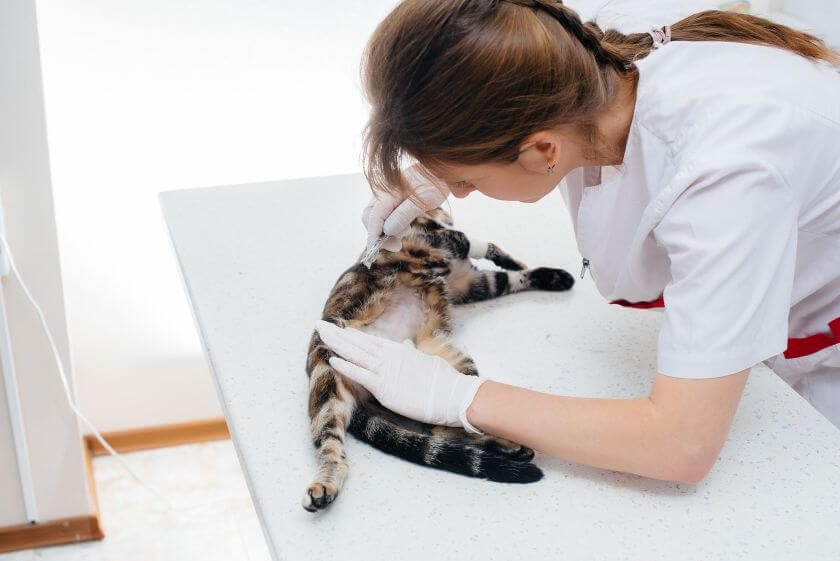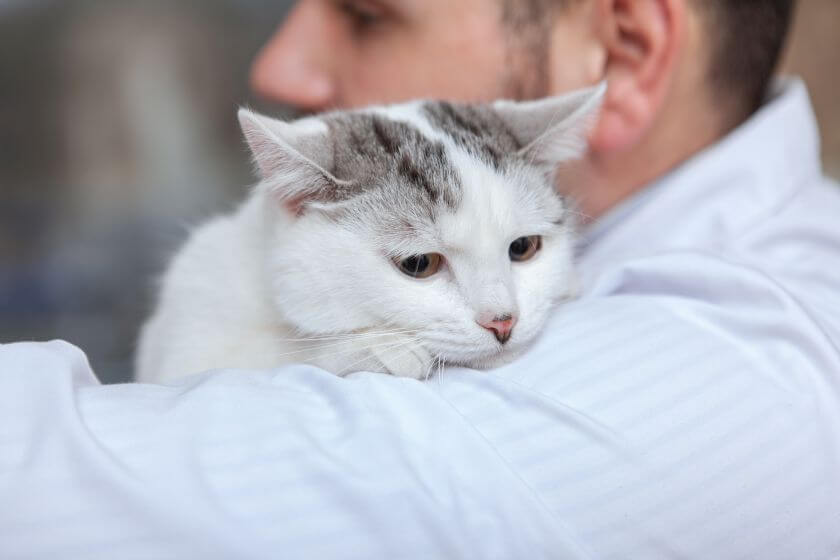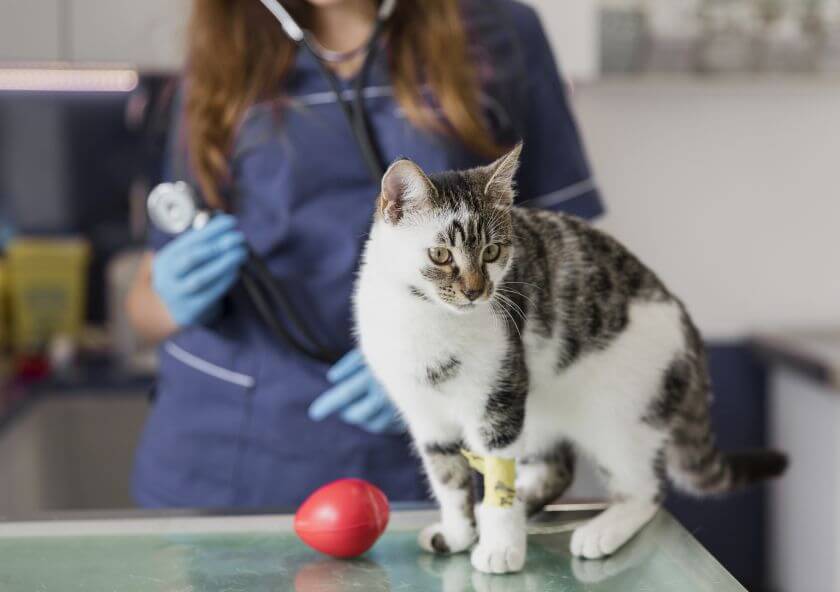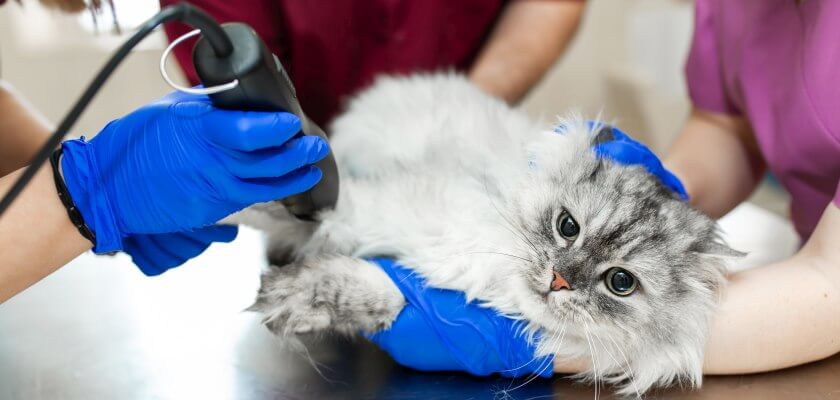Nowadays, birth control among domestic cats is an increasingly common practice. However, many people still fear that the cat will change her character after sterilization or that she will be unhappy. Fortunately, most of them have no real reflection whatsoever. So many myths have arisen around this type of procedure that most of us do not even realize that sterilization is not a term used correctly. In fact, we send the cat to the castration procedure.
Cat sterilization treatment – what is it?
Cat sterilization and castration – differences
There is still a common belief that males are castrated while females are sterilized. In fact, regardless of gender, any cat can receive either of these two treatments. The term “sterilization” in the context of females entered the colloquial language. When you ask for this procedure when you make an appointment, your vet will understand what you mean. However, you can be 98% sure that your cat will be neutered.
How are these two treatments different? Begin with the similarities – both are designed to limit fertility. They differ, however, in the way in which it occurs. Sterilization consists in ligation of the fallopian tubes (in females) or the vas deferens (in males). Castration, on the other hand, is the mechanical removal of the organs of the reproductive system. The testes are removed from males and the ovaries and uterus from females. Both treatments lead to infertility and both reduce the homelessness of domestic cats. So why is it that nowadays castration in the first place?

Limiting fertility is not the only goal of castration in a female cat. First of all, it extinguishes the action of sex hormones, and thus puts an end to oestrus behavior. Worms for females of this species are extremely tiring. They burden the body and lead to behaviors that are difficult for the caregiver to accept. In addition, if your cat is outgoing, they guarantee crowds of various types of admirers from the immediate (and not only) neighborhood.
Additionally, castration, as opposed to sterilization, excludes the risk of various types of hormonal diseases. It eliminates the risk of pyomyositis in one hundred percent, and if performed early, it also eliminates the risk of breast cancer.
Although, in fact, sterilization is a procedure practically forgotten by veterinary medicine, in everyday language it functions interchangeably with castration. That is why the use of this term is perfectly acceptable.
Castration treatment for kittens – how is it done?
The castration procedure for a female cat is now a routine procedure that almost every veterinarian will undertake. It is performed under general anesthesia and involves the surgical removal of the organs of the reproductive system. It is a permanent procedure, the effects of which cannot be reversed, therefore it is performed once.
When to sterilize a kitten?
Nowadays, more and more people are realizing that the castration of a kitten is a must. However, there are still debates as to when is the best time to do it. There are two schools among veterinarians. The first one, more conservative, assumes that one should wait until the first estrus before the procedure. The second – supported mainly by young doctors who learn from current scientific research – assumes that you need to castrate before the first heat. The sooner the better.

Many veterinarians still assume that too early castration can cause growth problems and inhibit a kitten’s physical and emotional development. In turn, more and more scientists are paying attention to the fact that such statements actually apply … in dogs. Cats, however, are a completely different species, with a different metabolic specificity. That is why it is more and more often believed that the best age to sterilize a female cat is between three and five months of age.
Early cat sterilization – what does it mean?
Is it possible to speak of early castration in this case? As always, a lot depends on location and practice. In the United States, from the beginning of the 21st century, it is the norm to perform procedures on kittens, that are just eight weeks old. At this age, cats are castrated in shelters and adoption organizations, as well as in many kennels.
In Poland, opinions are divided and early castration is usually referred to in the context of the one performed before the first estrus.
Cat sterilization – the sooner the better?
The main argument in favor of castrating cats before the end of puberty is the phenomenon of permanent heat. The first oestrus usually occurs between the sixth and tenth month of life. The cat’s behavior during her lifetime is non-specific. The animal becomes insistent, loud, moves in an unnatural way, may have problems with appetite and sleep. As you can guess, not only does it suffer, but also the rest of the household.
Heat in domestic cats usually lasts from seven to even fourteen days. Often, however, the phenomenon of permanent heat occurs, which does not cease. Then, the guardians placed against the wall start in a hurry to look for a way to interrupt it. In this case, there are only two ways – castration during heat or ending it with hormonal drugs. In a way, it’s a choice between a bad option and an even worse option. Giving your cat hormones is unhealthy and can have negative effects on her body. Castration in heat, however, is very difficult.

Usually, in such situations, it is recommended to stop the heat with castration, but as it has already been said, it is not a simple procedure. The uterus is then more supplied with blood, which increases the risk of complications. Many veterinarians do not undertake such procedures. Of course, in many cases they are very successful, but require a lot of practice from the doctor, often even specialization in surgery and anaesthesiology.
Behavior of the cat after sterilization
Many caregivers are concerned that after sterilization, a cat will experience irreversible changes in her behavior. Of course, depriving a cat of sex hormones has behavioral effects, but there is absolutely no need to fear them.
During adolescence, a kitten’s actions are driven by the female sex hormone estrogen. It influences, above all, the shaping of behaviors that enable better care for the offspring. It reduces the level of anxiety and fear and regulates the release of oxytocin after childbirth. These behaviors focus primarily on the reproductive process as well as pregnancy and the period of rearing offspring. Castration completely eliminates this area of the cat’s life. However, it does not change its character and does not increase aggression.
If you choose to castrate your kitten before puberty, you will most likely not notice any changes in her behavior after the procedure. Subsequent castration will simply eliminate heat-related behaviors.
Cat after sterilization – care
Castration of a female cat, although more invasive than in the case of a male, is still a routine procedure. It usually takes place in the morning. An older female cat should have fasted for about six hours, a younger one (under one year old) for four hours. Castration is performed under general anesthesia, so screening tests are usually performed prior to surgery to confirm that your cat is healthy. If the procedure proceeds without complications, the convalescent may return home on the same day. She may be a bit dazed after anesthesia by the end of the day.
If non-dissolving sutures were used for the procedure, an appointment will be necessary for the doctor to remove the stitches. Increasingly, however, the so-called intradermal suturing with the use of dissolving sutures is used. Then they disappear on their own. This method usually does not even require protective clothing, unless the kitten is overly concerned with the wound. The sutures are completely absorbed in about three weeks.
Cat sterilization – complications

Castration is a surgical procedure and therefore carries the risk of complications. Basically, however, it is safe and causes no complications. Factors that increase their risk include:
- hidden chronic diseases
- ongoing estrus
- anatomical defects
- the inexperience of the doctor.
Although, as a rule, every veterinarian will undertake the castration procedure, it is worth reporting it to people who are experienced or have a specialization in surgery. Also check if the clinic to which you report is carried out with an anaesthesiological assistance.
Also remember that there are cases when even the most favorable circumstances do not protect against complications and even death. Castration is an effective and safe procedure, especially in young and healthy cats. However, any medical procedure – even the simplest vaccination – in occasional cases can end badly. However, the likelihood of complications is very low.
Cat sterilization – price
Financial issues are important to many carers. How much does it cost to sterilize a cat? It all depends on the clinic’s reputation, the doctor’s experience, and even the size of the place where the procedure is performed. Usually the prices are in the range from 150 to 300 PLN. Remember, however, that the tests performed earlier and any follow-up visits are additionally payable.

Although the awareness of Polish society about limiting cat reproduction is growing, certain stereotypes are still repeated. Caregivers are concerned that their kitten will change after the procedure, that she will get hurt, and even that she will suffer from her inability to become a mother.
Before you make up your mind, remember that no matter how much you love your cat, it is first and foremost an animal. His behavior is dictated by instincts. The cat looks after her young because that is what her instincts and hormones tell her, not because she has a need for motherhood. Castration is safe, effective, and you are doing your kitty a huge favor by choosing to castrate it.
Bibliography:
1) “Cats – obstetrics and reproduction” Andrzej Marx
2) “Obstetrics and neonatology of dogs and cats” edited by Gary England and Angelica von Heimendahl
3) „Long-term risks and benefits of early-age gonadectomy in cats” C.V. Spaine, Journal of American Veterinary Medical Association, 2004

